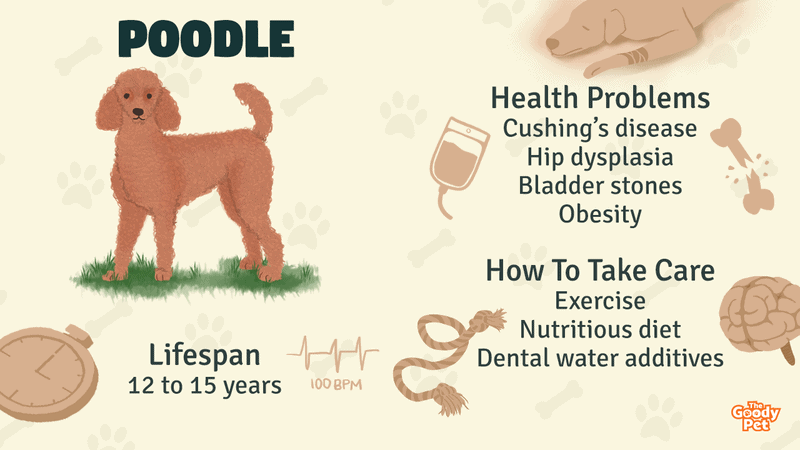The adorable and loving Poodle is generally considered to be a sturdy dog with a lower tendency to fall sick. However, if care isn’t taken, there is the possibility of certain health conditions developing during this dog’s lifespan.
So, what are the common health issues of the Poodle dog? Health conditions that Poodles are predisposed to include cancer, bloat, hip dysplasia, and Addison’s disease. Other health conditions that may be observed in Poodles include hip dysplasia, bladder stones, and obesity.
While there is no doubt that the Poodle is a relatively healthy dog, like all other dogs, this pooch is prone to falling sick if it isn’t properly taken care of. Consequently, today’s article focuses on feeding and exercise tips that’ll help maintain the quality of your Poodle’s life, as well as the health issues you should be on the lookout for. But before we delve into this, let’s see how long you can expect your Poodle dog to be around for.
How Long Does The Average Poodle Live?
Generally, the lifespan for the average Poodle typically ranges between 12 to 15 years.
However, the life expectancy of the Poodle dog varies slightly according to the size variant, and we’ll be taking a look at how long you can expect each pooch to be around for, in a bit.
What Are The Poodle Size Variations?
The American Kennel Club (AKC) officially recognizes the existence of three different Poodle size variations – Toy, Miniature, and Standard.
Toy Poodles are the smallest of the lot, and they typically weigh between 14 to 17 lbs. When it comes to height, the Toy Poodle stays true to its name, and this pooch stands just between 9.4 to 11 inches at maximum height.
Miniature Poodles, with maximum heights ranging between 11 to 14 inches, are considerably taller than Toy Poodles. And when fully grown, these poodles usually weigh between 26 to 31 lbs.
Standard Poodles, as expected, are the biggest of the lot, and adult weights ranging between 44 to 71 lbs are clearly larger than what is obtainable with the other Poodle size variants. The Standard Poodle also stands between 18 to 24 inches at maximum height.
How Long Does Each Poodle Variety Live For?
While the expectation may be that the bigger Standard Poodles should live longer, the reverse is the case, and several studies have shown that Toy Poodles are likely to live longer than the other Poodle size variations.
Toy Poodles have a median lifespan expectancy of 15 years, and these pooches are usually around for between 14 to 16 years.
Miniature Poodles, with an average age of 15 years, share the same life expectancy as Toy Poodles. But Standard Poodles, with an average age of 12 years, are only expected to be around for between 11 to 13 years.
It is important to note that these values are not set in stone, and with proper care, it is possible for a Poodle to live well into its twenties – The record for the oldest living Poodle ever belongs to a Poodle that lived for 28 years!

What Do Poodles Usually Die From?
Whether a Poodle is toy-sized, miniature, or standard-sized, the fact remains that dogs in this breed are susceptible to the same set of diseases.
That said, some of the leading causes of death in all size variants of Poodles include:
Cancer
Top on the list of diseases that Poodles commonly die from is the dreaded cancer.
Several studies have shown that cancer is responsible for death in approximately 27% of standard-sized Poodles, while this fatality figure stands at 18.5% for miniature Poodles. Toy Poodles are less likely to die from cancer than other Poodle variants, but regardless, a fatality rate of 11.4% is considerably high.
That said, the most common cases of cancer occurrences in Poodles include mast cell tumors, malignant lymphoma, soft tissue sarcomas, and mammary gland tumors, among others.
Bloat
Gastric Dilatation Volvulus, commonly referred to as bloat, is another medical condition that is responsible for a high number of Poodle deaths.
Bloat occurs when the Poodle’s stomach rapidly fills up with gas, food, or fluid due to the pooch eating too fast, stress, or genetic factors, and it is particularly prevalent among standard Poodles.
Trauma
While this can’t be classed as a medical condition, the high percentage of Poodles that die from different degrees of injuries sustained has earned trauma a spot on this list.
Fatal trauma refers to an injury to any part of the Poodle’s body, and it usually occurs via the dog being accidentally trampled on, hit by a passing vehicle or physical attacks from other dogs or animals.
What Health Problems Do Poodles Have?
Apart from the fatal health conditions listed above, Poodles are predisposed to several other diseases, which may not necessarily be fatal. Some of these diseases that a Poodle may suffer from during its lifetime include:
- Cushing’s disease
- Hip dysplasia
- Bladder stones
- Addison’s disease
- Obesity
- Tracheal collapse
Do Poodles Have Allergy Problems?
Poodles, like all other dogs, are prone to suffering allergic reactions, and one type of allergy that is rampant among this dog breed is food allergy.
On a positive note, it is almost unheard of for a Poodle to die from an allergic reaction, and by administering the proper treatment methods, this pooch will be back on its feet in no time.

How To Tell If Your Poodle Is Dying?
Death is inevitable, but it can be extremely difficult having to part with your dearly beloved furry friend. However, by watching out for telltale signs of death in an aged Poodle, you can strive even harder to ensure that the pooch is comfortable and its final days on earth are quite memorable.
That said, some of the physical signs and behavioral changes that are commonly observed in dying Poodles include:
Lack Of Coordination
As with humans, dying Poodles typically tend to lose body coordination as they near the end of their lifespans. This loss of body coordination typically manifests as clumsy behavior and the Poodle will find it more difficult to move around normally.
Incontinence
If you notice an increase in the frequency of excretory accidents in your aged Poodle, then it may be that such a Pooch is finding it hard to control its bowels. Incontinence typically marks the beginning of the end for an aged Poodle, and it is one of the more common indicators that the Poodle is nearing the end of its life.
Loss Of Appetite
Poodles aren’t particularly zealous when it comes to food, and when your aged pooch begins eating less frequently than usual, it can be a sign that the Fido is about to die.
Lethargy And Loss Of Interest
When an aged Poodle starts losing interest in the things that once used to pique its interest, and begins spending more time in solitude, then it may be that death is lurking.
Lethargic displays in dying Poodles can include a refusal to budge when called to play and declining invitations to go on walks.
Other observable signs that a Poodle is dying may include:
- Irregular breathing
- Changes in gum color
- Irritability
- Decrease in body temperature
- Twitching or shaking
NOTE: The majority of the symptoms listed above are general and often associated with the presence of other illnesses, and not necessarily death. If you notice any of these signs in a younger Poodle, you should book an appointment with your vet for a thorough medical diagnosis, as it may be that the pooch is suffering from a treatable illness.

How To Take Better Care Of Your Poodle?
Exercise Requirements
The Poodle is a high-energy dog breed that needs lots of exercising to stay physically fit and mentally stimulated.
Puppy Poodles typically don’t require a whole lot of exercising as their bodies may not be able to cope with the physical exertion. However, as a Poodle grows older, its exercise needs increase, and by the time this pooch is one year and above, it will need no less than sixty minutes of exercise per day to stay physically fit.
As a general rule of thumb, Poodles should be exercised 5 minutes per day for each month of age.
One or two brisk walks provide adequate daily exercise for a Poodle, but this should be complemented with purposeful play games such as fetch and tug of war and the provision of interactive toys for the pooch. Poodles are also great swimmers, and this can provide a great form of exercise for the pooch.
Puzzle toys should be provided to keep a Poodle mentally stimulated, and as the Poodle is very intelligent, you can also teach new tricks and commands.
Dietary Needs
As inferred earlier, Poodles are quite energetic; Hence, they require a diet rich in proteins and fats to meet and sustain their energy requirements.
When picking a food for your Poodle, select one that lists a whole meat, such as lamb, chicken, or beef as the first ingredient on the label. Food ingredients are typically listed on labels in order of declining weight; Hence, a whole meat ingredient being listed first typically indicates that such a diet is rich in protein.
Poodles do well with dry kibble, but if your preferred option is high-quality wet dog food, then we strongly recommend you go for the Pet Plate meal plan.
Pet Plate offers a highly balanced and nutritious diet that facilitates proper development in Poodle dogs. Additionally, Pet Plate meals are formulated with ingredients that dogs love eating, and with the Poodle’s reputation for being a rather picky eater, you will find this quite helpful.
Food supplements such as the Multivitamin Treats Supplements – Zesty Paws Probiotics can also play a vital role in improving your Poodle’s immune system function, enhancing coat and skin health, and reducing the occurrence of joint inflammation. However, you should consult your vet before incorporating supplements into your Poodle’s diet plan.
Water
Water is crucial in the physical development and health of a Poodle. And this pooch should always have easy access to clean and fresh water. It can also help to invest in dental water additives to maintain great oral hygiene in the poodle.
What Foods Are Poodles Allergic To?
As we’ve mentioned earlier, Poodles are allergic to various food substances. And to avoid triggering reactions in your Poodle, it is best that you familiarize yourself with food substances that the pooch is allergic to and eliminate them from its diet.
That said, some of the food substances that are commonly known to trigger allergic reactions in Poodles include fish, lamb, dairy, wheat, egg, corn, and even beef. It is also quite possible for a Poodle to be allergic to two or more of these food substances at the same time.
Related Questions
How Long Do Poodle Mixes Live? A Poodle dog is expected to live for between 12 to 15 years, while a Poodle Mix is likely to live longer, between 14 to 16 years. Poodle mixes are healthier than their purebred counterparts as the prevailing ailments in Poodles do not usually get carried over in the offspring of the mixed breed. That isn’t to say the purebred Poodle doesn’t live long, and with proper care, this pooch will match its mixed brothers in longevity.
Which Size Poodle Is The Healthiest? Poodles generally come in three size variations – standard, miniature, and toy. That said, the Standard Poodles, which typically weigh between 40 to 55 lbs and stand over 15 inches tall, are generally considered to be the healthiest of the bunch. Toy Poodles, on the other hand, are ranked as the unhealthiest.
Do Poodles Get Fat? Poodles, like most other dog breeds, are predisposed to obesity and can get fat if care isn’t taken. And while owners must be strict about feeding their Poodles, this dog breed isn’t known to overeat, and its predisposition to obesity is more of a genetic problem.





